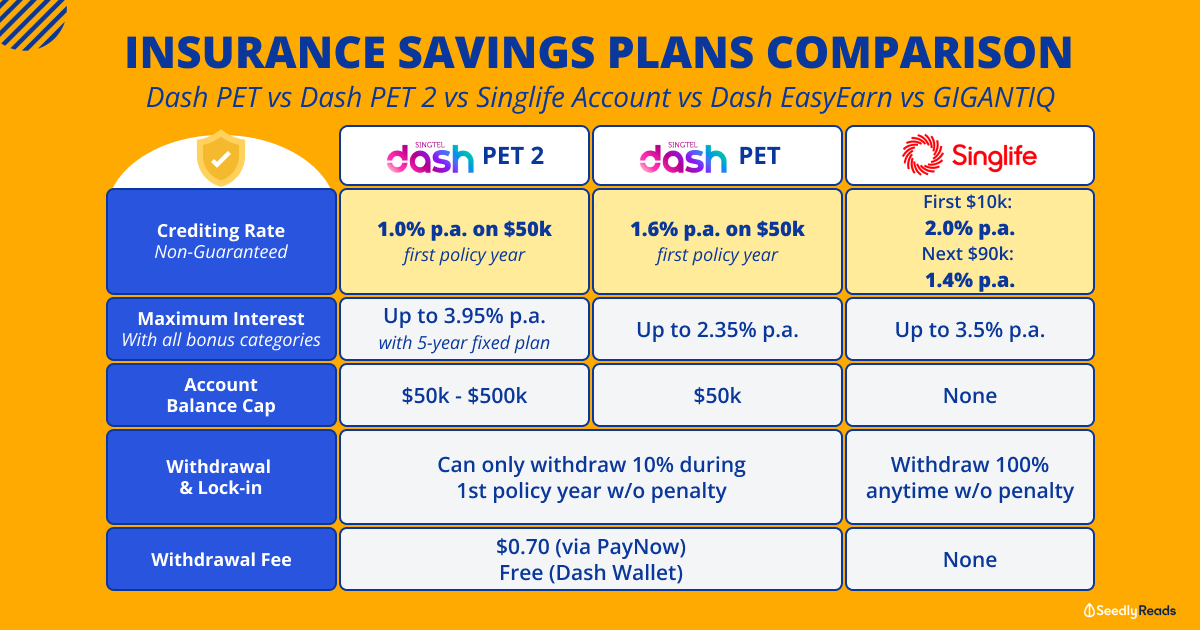Advertisement
Anonymous
As a fresh grad, what is some of the best insurance plans and savings accounts to consider?
6
Discussion (6)
Learn how to style your text
Elijah Lee
27 Sep 2019
Senior Financial Services Manager at Phillip Securities (Jurong East)
Cedric Jamie Soh
27 Sep 2019
Director at Seniorcare.com.sg
Paying off your loan at 4.5% is definitely better than saving your cash in a bank (around 1-2% PA) however, do make sure you have a small sum of money for emergencies (both good and bad- for example, an accident for medical treatment, or an opportunity for overseas travels etc)
SC Jumpstart (2% p.a) and CIMB FastSaver (1% p.a) for savings are good. You've already done your research ;)
I will take Jumpstart as it is designed for young savers :)
If you can do salary crediting, these accounts are not bad to read up too
- OCBC 360 account
- DBS multiplier account
- UOB One Account
You may also consider learning about ETF, stocks, and robo-advisors, start learning investment early and start SMALL (since you only fresh grad)
Reply
Save
In my opinion, the most important insurance plan to get is the hospitalisation plan. It covers most, if not all, of your hospitalisation fees, including most treatments/surgeries.
As for savings account, seedly actually has a calculator that you can use to calculate which account suits you the best: https://seedly.sg/tools/savings-account-calculator
Reply
Save
Jim Ng
28 Oct 2018
Marketing Strategist at https://www.bestseo.sg
For wealth protection (insurance):
Take up an Integrated Shield Plan, along with the rider to ensure that your hospitlisation bills are 100% covered (minus the 5% co-payment that the government has recently introduced). This is crucial as you have to protect your own wealth first before you can protect your family by leaving behind a sum for them.
Next, ask yourself, who are your dependents? Are they your parents? Or do your parents not need you to leave behind a sum since they've planned for their retirement? Calculate how much you need to leave behind for them.
If you wish to set aside some money for them in the event of your death/disability/critical illness, you could plan on getting some life insurance (MINDEF/MHA Group Term Scheme at $1milllion dollars for $41 per month) just in case you pass on, critical illness insurance (You could add a rider on MINDEF/MHA Group Term) to replace your income and a simple disability policy (most companies rates are the same) to replace your income.
For wealth accumulation / savings accounts:
You can consider using Singapore Savings Bonds to deposit your monthly income (if you can save aside $500 at least) , the interest rate is extremely competitive as compared to local banks' savings accounts/fixed deposits/current accounts. It is fully liquid and you can take out anytime you wish to.
Starting at 1.8% in the first year, with no minimum requirements to hit any spending or depositing or paying of any bills or any insurance payment, unlike the banks.
Read more on my article on why I recommend SSB here:
Reply
Save
Brandan Chen
28 Oct 2018
Financial Planner at Manulife Singapore
As a fresh grad, there may be different forms of liability or short term expenses you may face:
- S...
Read 3 other comments with a Seedly account
You will also enjoy exclusive benefits and get access to members only features.
Sign up or login with an email here
Write your thoughts
Related Articles
Related Posts
Related Products

Standard Chartered JumpStart Account
4.8
785 Reviews
Maximum Interest: 2.50% p.a. for balances up to S$50,000
INTEREST RATES
$0
MIN. INITIAL DEPOSIT
$0
MIN. AVG DAILY BALANCE

DBS/POSB Multiplier Account
4.3
329 Reviews

OCBC FRANK Account
4.7
213 Reviews
Related Posts
Advertisement









If you don't spend a lot, the OCBC 360 account is a good option, as you'll get 1.2% -2% just by crediting your salary, and an additional step-up increase just by saving more in the account. There's no requirement to spend on your credit card or invest with them.
Paying off your student loans would be better at this time before you start investing, as 4.5% interest is quite hefty. It is good that you are saving ~$1000 a month, so just continue to save first till you have at least 12 months of expenses set aside, and then you can start to invest.
Having said that, please ensure that you have adequate insurance such as hospitalization, critical illness and death cover (if you have dependents e.g. parents), this is the very first thing you need to do before you invest. Speak to an independent advisor such as myself to understand the types of plans/coverage and your needs so that you can get the most effective and cost-efficient cover for your premiums.
Once your emergency savings and your insurance are settled, you may start to invest. There are many asset classes and it will also be good to spend some time understanding them so that you can have an idea of what may suit you. Again, an independent advisor will be able to assist you with your understanding and help guide you. Your $1K/mth saving will become a $1K/mth cashflow that you will have to divide between the asset classes of your choosing in order to build your portfolio over time.